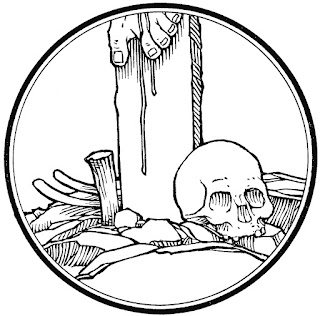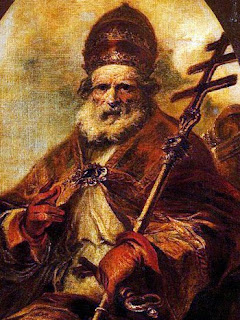WE CONFESS NOT WHAT SEEMS REASONABLE, BUT WHAT IS REVEALED.
In the name + of Jesus.
We might like to think that there was a
golden age in the Christian Church when God’s people had everything right and
there was great harmony. But that is not
true. There have always been enemies both
outside and inside the Church. St. Paul
mentioned “the trials that came to me due to the plots of the Jews” (Acts
20:19). When Paul came to a new
city, he went to synagogue to declare that Jesus of Nazareth is the Christ they
had been waiting for. He had fulfilled
all God’s promises and died as the atoning sacrifice for our salvation. Many received that message with great joy. Others fought fiercely against him. They slandered him, attacked him, and drove
him from various cities. In addition,
the Roman government persecuted Christians because they refused to confess, “Caesar
is Lord.” We are not surprised that
those outside the Church would attack it.
When St. Paul met with the pastors who
served the church in Ephesus, he warned them, “I know that after my
departure savage wolves, who will not spare the flock, will come in among you. Even from your own group men will rise up,
twisting the truth in order to draw away disciples after them. Therefore be always on the alert” (Acts
20:29-31)! These attacks are more dangerous
and damaging because they rise up from within.
Pastors and teachers, who were presumably trustworthy, perverted the
words of God. They did not reject God’s
word, but twisted it to make it say what they wanted it to say. Sometimes this twisting is done with evil
intent; sometimes it is because they themselves have been deceived. Our Lord calls us to be alert, not to be
swayed by any pastor no matter how nice he is or how smoothly he speaks. We must cling to the word of God and let
nothing budge us from the sure teachings of God.
In 313 AD, Emperor Constantine passed the
Edict of Milan which legalized the Christian religion. Constantine not only legalized Christianity,
he was converted to it. All good news
for the Christian church, right? But it
was about this time that a pastor from Alexandria, Egypt, began teaching a new
doctrine. His name was Arius. In short, Arius taught that Jesus is not really
God.
The way Arius taught this was so deceptive
because of how reasonable he made it all sound. Arius argued that, if Jesus is the Son of God,
and if the Son was begotten of the Father, then there was a time when he did
not exist. After all, I did not exist in
1950. My beginning is usually marked by
my birthday. So, if God the Son is begotten
of the Father, then he had a beginning.
If he had a beginning, he is not eternal. If he is not eternal, then he is not really
God. Perhaps he had a special status,
but not God from eternity. Arius’ logic
appealed to many. Arius even drafted
hymns to reinforce his teaching. Arius’
teaching threatened to divide, if not destroy, the Christian Church.
Emperor Constantine took action. Perhaps it was because he had a legitimate
concern for the Christian faith. Perhaps
it was because he wanted to retain unity and harmony in his Empire. Probably a bit of both. In any case, Emperor Constantine summoned
bishops from all over the Roman Empire to convene at a city called Nicaea which
is in modern-day Turkey. So, 1,700 years
ago this week, more than 300 bishops gathered to address Arius’ teaching and
some other issues that were threatening to divide the Christian Church. Their goal was to maintain the unity of the Christian
confession. They were to confess not
what seemed reasonable, but what was revealed.
Perhaps this issue sounds like pastors
debating over doctrinal minutiae that has no real significance in day-to-day
life. Tomorrow, you will head off to
work, give diligent attention to your responsibilities, and go home. You will prepare a meal, eat, and clean up. You might take a walk, mow the lawn, or
scroll on your phone before going to bed.
Not once will you think about the theological wranglings that happened
at Nicaea 1,700 years go. I don’t say
that as a rebuke, but understanding reality.
In the same way, we don’t really give our
attention to major events which have affected our lives. We don’t think of the Magna Carta, the
Revolutionary War, or the Battle of Midway.
If these events had turned out differently, our lives would be
significantly different, too. So also
with the Council of Nicaea. From it, we
have received a confession of the true, Christian faith. From those bishops, we learn to confess not
what seems reasonable, but what is revealed.
The Council of Nicaea thwarted a heresy
which would destroy the Christian faith.
If Arius was right and Jesus is not true God, then you are damned. If Jesus of Nazareth is not true God, then it
was a man who went to the cross and died.
All his claims are lies. All his
promises are useless. Even if we say
that Jesus of Nazareth was a holy man, then he earned his place in the kingdom
of God, but he has done nothing for you.
This is what the Lord says: “Truly no man can ransom another, or give
to God the price of his life” (Psalm 49:7). If Jesus is only a man—even a special man,
given special gifts by God—then he has done nothing to help you.
This is what the Council of Nicaea
addressed. They did not vote on whether
or not Jesus is God as The DaVinci Code asserted. They did not invent doctrine. They turned to the Scriptures to see what God
had revealed there. Arius trusted in
reasoning; the bishops confessed what was revealed: Jesus is Immanuel, God with
us. Jesus declared, “I and the Father
are one” (John 10:30). Since there
is only one God, Jesus’ claim is that he is God. Jesus told the Pharisees, “Before Abraham
was, I am” (John 8:58). That means
he is eternal. Only God is eternal;
therefore, Jesus is God. Even Jesus’
enemies understood his claim. That’s why
they tried to stone him for blasphemy. Most
important of all is that Jesus declared he would suffer, die, and rise on the
third day, just as the Old Testament had prophesied. And then he did it. The Church did not invent these things. The apostles witnessed them and then recorded
them. We confess not what seems
reasonable, but what is revealed.
The Council of Nicaea drafted a confession
to determine which pastors were faithful to the Christian faith and which were
not. It was the first draft of the
Nicene Creed. (This confession was
updated and adopted at the Council of Constantinople in 381 and is our current
Nicene Creed.) To confess what Scripture
reveals, the Nicene Creed is more detailed than the Apostles’ Creed. The bishops at Nicaea confessed that Jesus
Christ is “God from God, Light from Light, true God from true God, begotten,
not made, being of one substance with the Father” (Nicene Creed). Arius would never make this confession. Nor do Jehovah’s Witnesses or Mormons
today. This confession is a symbol of
the true Christian faith. We confess not
what seems reasonable, but what is revealed.
The spirit of Arius still persists within
Christendom. It is the spirit of using
one’s reason to try to unravel the mysteries of God. It is the desire to make God and the Bible agreeable
to our way of thinking. The prayer is,
“Make it make sense!” But reason does
not always mesh with what God has revealed.
For example, the Bible teaches that God “chose us in (Christ) before
the foundation of the world, that we should be holy and blameless before
him. In love he predestined
us for adoption to himself as sons through Jesus Christ” (Ephesians
1:4-5). Now, if God chose some for
salvation, reason concludes that those who were not chosen to be saved were
chosen by God to be damned. That sounds
reasonable. But what has God revealed? “God our Savior, who desires all
people to be saved and to come to the knowledge of the truth” (1
Timothy 2:3-4). God is not willing
that any should perish, so he certainly did not predestine people to be
damned. We confess not what seems
reasonable, but what has been revealed.
When we use our reason to rule over the
Scriptures, the result is dangerous at best and destructive of the faith at
worst. Your defense of your sins seems
reasonable to you because if you are determined to do something, it makes sense
to you. “I had good reasons to lie, to cheat,
to blame God, to curse my neighbor.”
Why? “Because: reasons!” Everything
we think, say, and do makes a confession.
The question is: Whose word are you confessing?
To confess means to say the same thing. To confess the Christian faith, we say the
same thing as God reveals in his word.
When God’s word reveals, “You are a sinner,” we confess, “I am a
sinner.” When God’s word reveals that
Jesus, the Son of God, came to take away our sins, we confess, “I believe that
Jesus Christ is the Son of God and my Savior.”
When God reveals that he created the universe in six 24-hour days, we
confess, “I believe in God the Father Almighty, maker of heaven and earth. I reject evolution which says he did not.” When Jesus tells us regarding the consecrated
bread and wine, “This is my body. This
is my blood,” we confess, “It is the true body and blood of our Lord Jesus
Christ under the bread and the wine, given to Christians to eat and to drink
for the forgiveness of sins.” When God
reveals that marriage is a union of one man and one woman, we confess,
“Marriage is the life-long union of one man and one woman. Anything that differs from it is wicked.” When God reveals that the pastoral office is
limited to men, we confess that only males may serve as pastors. When God reveals that we are to forgive those
who sin against us, we pray, “Forgive us our trespasses, as we also forgive
those who trespass against us.” We
confess not what seems reasonable, but what is revealed.
Granted, sometimes what God reveals is
hard. It may offend your reason. It certainly offends our culture, which has instructed
and influenced us more than we would want to admit. Much of what our culture teaches us seems
reasonable because so many people live by it and defend it. But the question is not, “Is it
reasonable?” The question is, “Did God
reveal it?” We confess not what is
reasonable, but what is revealed.
In 325 AD, about 300 Christian bishops met to make a bold and faithful confession of the Christian faith. That also meant condemning what stood against the faith. It meant forsaking what seemed reasonable to maintain what is revealed. We pray the Holy Spirit will instill in our spirit the same conviction to the Scriptures in word and deed. “And now I entrust you to God and to the word of his grace, which has power to build you up and to give you an inheritance among all those who are sanctified” (Acts 20:32).
In the name of the Father and of the Son + and of the Holy
Spirit. Amen.



%20(Mk%208.27-38).tif)


